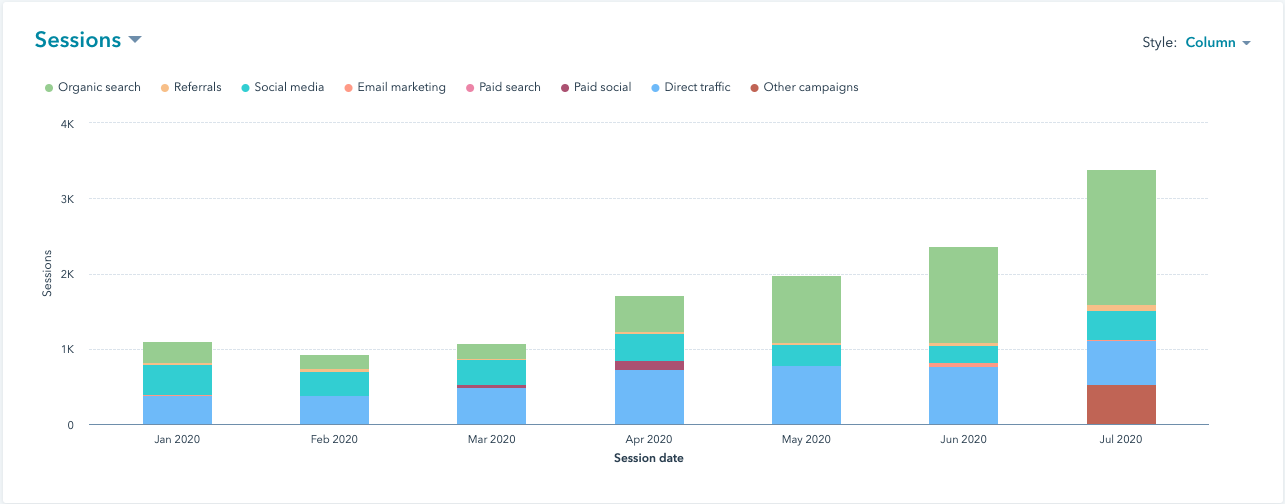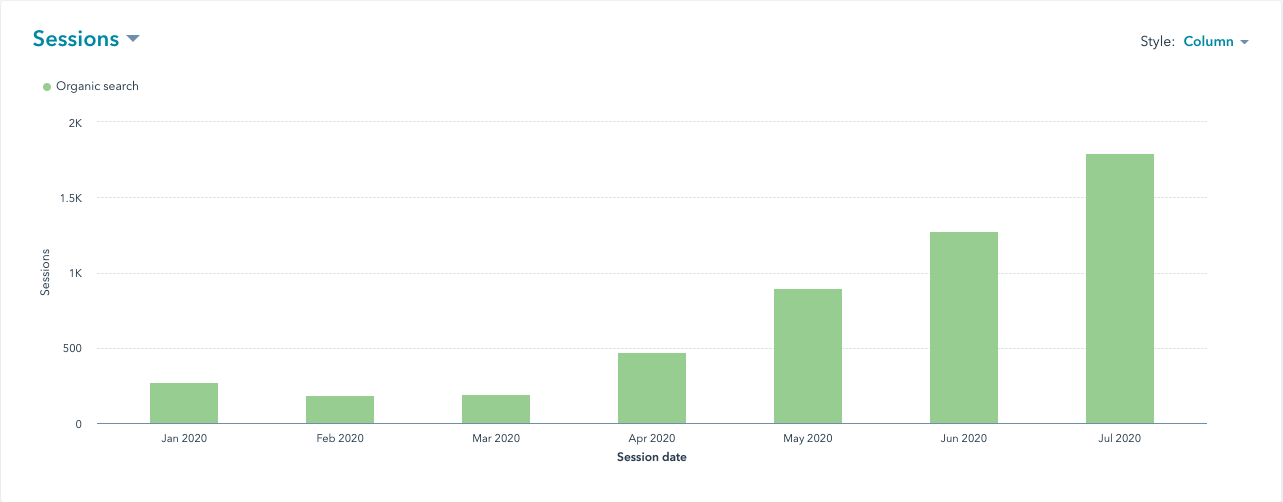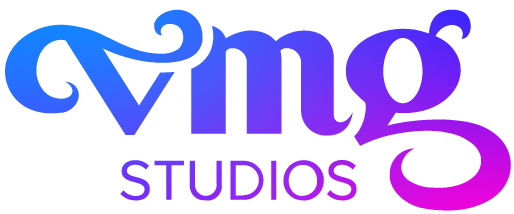
I have been the content marketing manager at VMG Studios for more than a year, and while content marketing is now my world, I’ll be honest, I didn’t really know what it was before.
After reading “They Ask, You Answer” by Marcus Sheridan and working with our good friends at IMPACT and HubSpot, it has become an invaluable marketing philosophy that I can’t believe people haven’t been doing for decades.
The concept is really simple.
Answer all your customers’ questions with educational content and post it on your website.
This helps build your website’s search engine optimization and draws in potential new clients through organic search. And while it takes a lot of work to implement and keep up with this strategy, it works.
Need proof?
Since the beginning of 2020, VMG Studios has seen a 472% increase in overall website traffic through the end of October and a staggering 1,424% increase in organic search traffic which has brought in leads for new business.
Content marketing has truly helped keep us afloat during the unprecedented times of COVID-19 as we’ve shifted our services – which include marketing strategy, video production, animation, and graphic design – to best meet the needs of our target clients. We’ve even started suggesting content marketing to some of our clients as we’re all trying to navigate this new economic space.
In this article, I’m going to dive more into what content marketing is, how it works, and why your business should consider adding it to your current marketing strategy.
What is Content Marketing?
When I was first learning about content marketing, a subset of inbound marketing, I wanted to know how it was different from traditional “outbound” marketing.
Traditional “outbound” marketing interrupts your audience with content they don’t always want, while “inbound” marketing forms connections they are looking for and solves problems they already have. It utilizes a search engine optimization strategy to target keywords relevant to your brand’s service offerings.
Basically, your target audience discovers your company instead of the other way around.
As far as formal definitions go, I think the Content Marketing Institute says it best:
Content marketing is a strategic marketing approach focused on creating and distributing valuable, relevant, and consistent content to attract and retain a clearly defined audience – and ultimately to drive profitable customer action.
One of the major benefits of content marketing is it’s all promoted digitally – which helps attract potential new customers to your website and/or social media channels.
How Does Content Marketing Work?
Think about it from the consumer point of view. Before you buy something, you probably do some research first, right? You want to ensure that you’re buying the best product or service that will meet all your needs. You’ll likely turn to Google and type something like, “Fitbit vs. Apple Watch” or “How much does a closet organizer cost?”
If you own an interior design company, you’d want your business to pop up when someone puts in a search for the cost of a closet organizer.
This is where content marketing comes into play.
By implementing SEO best practices on the content you’re posting (more on this shortly), such as meta descriptions, alt text, and more, your article on the cost of closet organizers would (hopefully) appear on the front page of Google when someone searched for it.
If someone clicks on your article, it will drive them to your website where you’ll include strategically placed call to actions to capture people’s information which can lead to a potential conversion.
That’s the short answer in regard to how content marketing works. Naturally, there is a lot more to it, and it’s a slow and steady process.
When VMG Studios first began content marketing and consulted with our friends at IMPACT, they told us to anticipate a “hockey stick growth” in terms of overall website and organic search traffic over time. And they were right.
Take a look at this screenshot of VMG Studios’ overall website analytics starting in January of 2020 through the end of July.

And now take a look at the spike in organic search traffic in that same period of time.

Many of our articles are now ranking on the first page of Google for their intended keywords. We also have nearly 100 pieces of various content, like articles, videos, eBooks, and infographics, on our learning center.
This all works in tandem to help increase our search ranking, allowing potential new clients to find us through educational research.
Benefits of Content Marketing
There is a lot of grunt work that goes into successfully implementing a content marketing strategy, but once you start seeing the results, it really puts into perspective how simple the idea of content marketing is.
Why don’t we answer all the questions a potential client may have in an article or video and post it on our website?
Here are the 3 main benefits of content marketing (although, the list in my mind goes on and on and on…which you'll notice in the video further down).
1. Content Marketing Helps Improve SEO
I’ve touched on this already, but it’s true. The more relevant content you put out there, the more Google will recognize and reward it in its tricky, ever-changing algorithm.
This increase in search traffic can help generate new leads, which is really what we’re looking for in any marketing strategy. Generating leads helps drive conversions.
When your content is constantly being blasted to your target audience, you’re also building brand visibility.
An old marketing principle stated that a prospect needs to hear or see a message 7 times before making a purchasing decision. Due to the overwhelming amount of readily-available content now, that number is likely even higher. Therefore, the more content you have out there, the more likely someone will remember your brand and convert into a paying customer.
2. Content Marketing Assists in the Sales Process
The marketing department helps bring in leads, but a big part of the sales process is qualifying or disqualifying new leads. This can be a time-consuming process for a sales team, big or small.
Content marketing can help better qualify leads, ultimately, saving the sales team time.
By writing articles covering the most frequently-asked questions, the sales team can send those educational resources to a potential new lead instead of having to answer them time and time again in an email or phone call.
It may also help eliminate leads that aren’t a good fit for your business.
This is especially true when it comes to cost-related questions and articles. By supplying prospects with cost articles, they can decide whether or not they can afford your product or services before scheduling a call with a sales representative.
3. Content Marketing Establishes Thought Leadership and Expertise
If you work in a competitive field, being a leader in your industry is imperative to winning business. Content marketing helps show off your knowledge, skills, and expertise beyond portfolios and customer testimonials.
This is a great opportunity, as well, if you notice none of your competitors are doing content marketing. You’ll be able to fill the void and attract new clients who may not have found you otherwise.
Besides establishing your company as a thought leader in your industry, providing educational material on your expertise offers transparency. And transparency is big for consumers. A study found that 94% of customers are likely to be loyal to a brand that offers complete transparency.
Sounds like a win-win situation, if you ask me.
READ MORE: 7 Benefits of Content Marketing
Types of Content
I’ve mainly talked about articles throughout this article (which makes sense, obviously), but there are several different types of content to offer.
The two main ones are:
• Articles
• Videos
Articles are generally a good place to start, since they’re easier to produce, especially with just one person. Videos take a little bit more leg work including equipment and bandwidth, however, statistics show that many people prefer video over text when learning about a product or service.
For example, we have an article and video covering the same topic: Closed Captioning vs. Subtitles: What’s the Difference? While they were released on the exact same date, the video has 22 times the amount of views as the article.
Pro tip regarding articles: Google takes page loading speed into account when ranking content, so it's important to make sure the file size of your images isn't too big. This video breaks down a quick trick on how to reduce your image file size in Photoshop while retaining the quality.
Besides articles and videos, call to actions are a huge part of content marketing. CTAs allow for the opportunity to capture potential client’s information, such as their email, in exchange for an educational, downloadable offer that applies to the topic of the article or video they’re consuming.
CTAs can include, but aren’t limited to:
• eBooks
• Infographics
• Worksheets
• Templates/outlines
By offering CTAs, you’re giving your reader or viewer more reason to trust you through the valuable content you’re providing. You’re also guiding them through the sales funnel in the hopes of converting them into an actionable lead.
FREE DOWNLOAD: CONTENT MARKETING 101 WORKSHEET
Implementing Content Marketing to Your Business Strategy
Building trust with clients is becoming more and more important for businesses to attract and retain customers. A survey found two-thirds of U.S. adults say that trust in a brand has a great deal or a lot of influence on their purchasing decisions.
Besides aligning your mission statement, company values, and business practices with your target audience, implementing content marketing shows transparency which can help build that ever-important trust factor.
Content marketing allows potential clients to find your business (instead of the other way around) through educational resources and organic search traffic while also saving your sales team time when it comes to qualifying new leads. It can also help separate your business from your competition by establishing thought leadership within your industry.
Naturally, content marketing is a commitment and it does take some time to begin to see results, but when you see a 553% increase in organic search traffic in just over half a year, it’s hard to ignore this as a successful strategy.
To start building your content marketing strategy, learn how VMG Studios can support you with various video content, branded design templates, social media content, and more.






